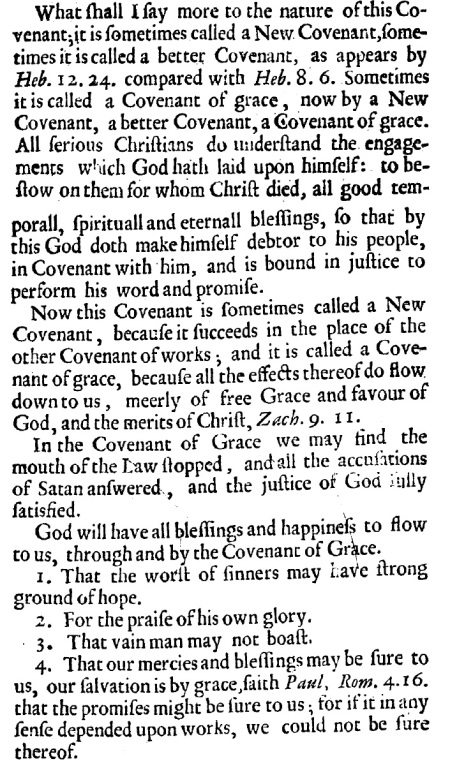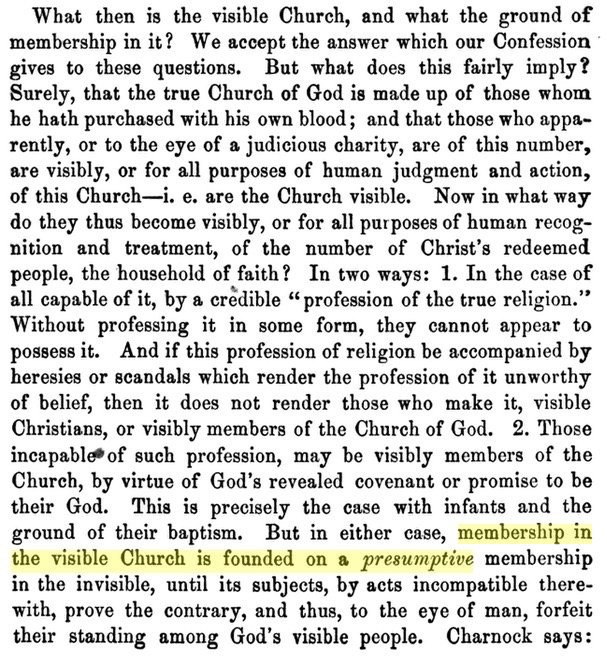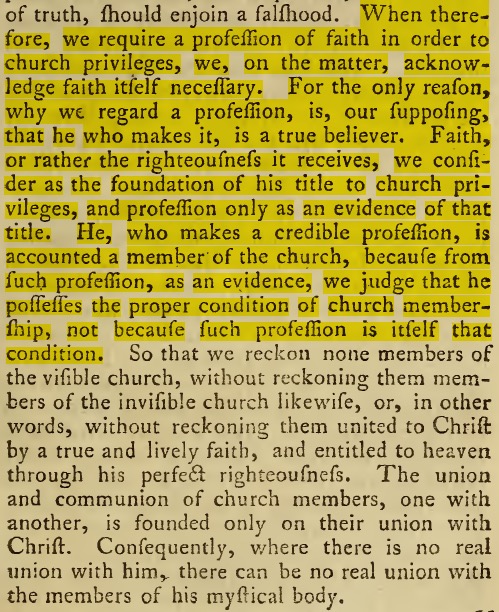Resources
An Objection to the Covenant of Works (lectures)
On 02, Apr 2014 | In Audio, Resources, Richard Barcellos | By Brandon Adams
|
|
|
|
Of God’s Covenant (Keach Conference 2013)
On 02, Apr 2014 | In Audio, Resources, Richard Barcellos | By Brandon Adams
|
|
Form and Matter + Promise and Promulgation = Particular Baptist Federal Theology
On 01, Nov 2013 | In Resources, Samuel Renihan | By Brandon Adams
See this helpful post from the Particular Voices blog:
Form and Matter + Promise and Promulgation = Particular Baptist Federal Theology
Covenant Theology Lectures – Sam Renihan
On 12, Aug 2013 | In Audio, Resources, Samuel Renihan | By Brandon Adams
Here are three sermons from Sam Renihan dug up by Jason @ the Confessing Baptist Blog
- Covenant Theology Foundations
- Kingship and the Davidic Covenant
- Redemptive History and the Covenants
- Why Did God Exile Israel?
- Why Did God Destroy Israel?
A Brief Survey of Covenant Theology (Barcellos)
On 17, Jul 2013 | In Audio, Resources, Richard Barcellos, Video | By Brandon Adams
|
|||||||||||
|
|||||||||||
|
Sermon: The Primacy of the Abrahamic Covenant
On 24, Jun 2013 | In Audio, Jeffery Johnson, Resources | By Brandon Adams
The Primacy of the Abrahamic Covenant
Pastor Jeff Johnson, author of The Fatal Flaw Behind The Theology of Infant Baptism, shows us how the Abrahamic Covenant unifies the Old Testament and the New Testament; the Old Covenant and the New Covenant, the demands of the law and the glory of grace.
Particular Voices
On 09, Jun 2013 | In Resources, Samuel Renihan | By Brandon Adams
P A R T I C U L A R V O I C E S
“Interesting bits and pieces from 17th century literature”
A blog dedicated to reviving the voices of 17th (and 16th) century theologians, especially the Particular Baptists. To be clear, just because a portion of someone’s work is posted does not mean that their assertion in particular or their theology as a whole is being endorsed. In each post, click the image for a larger version of the text.
Pascal Denault Interviewed on the Confessing Baptist
On 07, Jun 2013 | In Audio, Pascal Denault, Resources | By Brandon Adams

On episode two of our podcast, we interview Pascal Denault on his new book The Distinctiveness of Baptist Covenant Theology: A Comparison Between Seventeenth-Century Particular Baptist and Paedobaptist Federalism.

On episode three of our podcast, we finish up our two part interview with Pascal Denault on his new book The Distinctiveness of Baptist Covenant Theology: A Comparison Between Seventeenth-Century Particular Baptist and Paedobaptist Federalism.
Reformed Baptist Covenant Theology & Biblical Theology
On 07, Jun 2013 | In Resources, Samuel Renihan | By Brandon Adams
Reformed Baptist Covenant Theology & Biblical Theology by Samuel Renihan and Micah Renihan
This material was presented by the authors to students of Westminster Seminary California during a lunch hour on campus in response to their inquiries about how Reformed Baptists view covenant theology. Given the time constraints of a one-hour presentation, the focus of the material was on areas of positive argument for the credobaptist position where it differs from paedobaptism…
There is one uniting and driving force in redemptive history, and that is the Covenant of Redemption. Although it is not accomplished in history until Christ comes, we see the gathering in of the elect who believe in Christ from the fall onward. Where we see that in-gathering of the elect who believe in the gospel as it is revealed progressively in types and shadows, there we see the retro-active New Covenant, and that is the Covenant of Grace… The Covenant of Grace is the retro-active New Covenant…
As Vos goes on to say, the New Covenant is necessarily connected to the new age, the consummation. With the inauguration of the New Covenant, the New Age breaks forth into this current age. Vos says, “The New Covenant, then, coincides with the age to come; it brings the good things to come; it is incorporated into the eschatological theme of thought.” If the New Covenant truly coincides with the New Age, we should not look back at the Old Covenant to understand this New Covenant. Instead we should look forward to the consummation. True, we live in the “not yet.” But it is just as true that we live in the “already”. For this reason we must conclude that theologies that rely too heavily on the Old Covenants for their description and articulation of the New Covenant demonstrate an under-realized eschatology. They do not give enough weight to the “already”.
What’s the Difference? Michael Horton v Jeffrey Johnson
On 07, Jun 2013 | In Jeffery Johnson, Resources | By Brandon Adams
The following is a “debate” between Michael Horton and Jeffrey Johnson on covenant theology:





